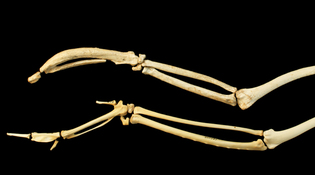 loading
loading
FindingsAngry birds Nicholas LongrichThe wings of the Xenicibis, or "bizarre ibis" (top), are unlike those of common ibises (bottom)—or any other bird. Researchers believe that the unusual long, curved bone in the bird's "hand" was wielded like a club in territorial disputes. View full image
When a species of bird loses its ability to fly, its wings typically evolve according to a predictable pattern: over the generations, as the wings are used less and less, they get smaller and smaller. So when Nicholas Longrich, a postdoctoral fellow fond of scouring museum collections for interesting specimens, happened upon a skeleton of Xenicibis xympithecus, he was initially puzzled. The 2,000-year-old Jamaican ibis had long wings, yet it was clearly flightless: the short "fingers" and thick bones of its "hands" would have made flying impossible. In fact, those same features suggested that it had found a novel use for the limbs. "No flying bird has a wing remotely like this," Longrich says. Longrich and a coauthor mulled several theories. Could the Xenicibis (whose name means "bizarre ibis") have walked on its front limbs? Could it have used the heavily muscled joints to climb trees? But after studying the belligerent behavior of other ibis species, the team settled on a martial explanation: "It didn't stop using its wings," Longrich says. "It took them and turned them into a weapons system." (The study was published in the Proceedings of the Royal Society B.) The large bones at the end of the bird's muscled wings functioned like clubs, Longrich argues. Those bones were short but dense, enabling the bird to whip them quickly from the side of its body, "almost like a karate chop," or "like swinging a baseball bat." It's unclear who the target of the Xenicibis's violence was, but Longrich says it's likely the birds used their wings to compete with others in their species, perhaps over mates or territory. Most flightless birds evolve in areas with few predators, he notes, which leads to heightened competition for resources: "It's kind of like apartment hunting in New York City. If you have this population that's not really dying, it's going to be hard to find territory."
The comment period has expired.
|
|